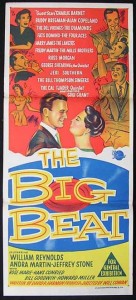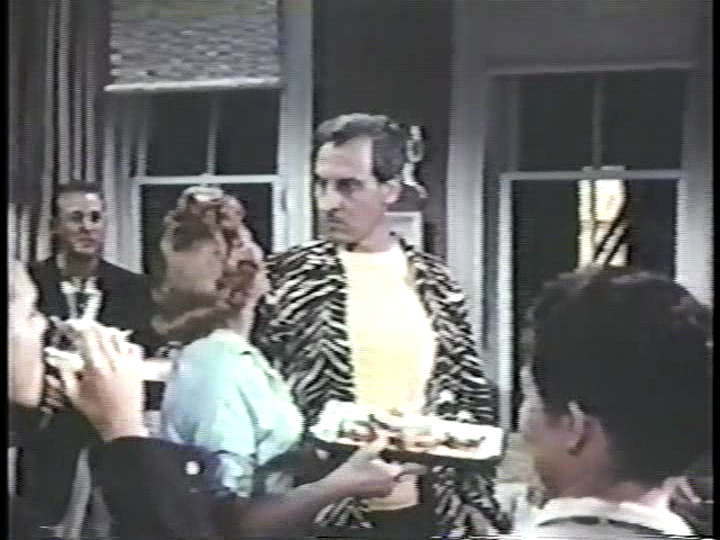|

Synopsis:
The son (William Reynolds) of a “square” music producer (Bill Goodwin) tries to sign on some hot rock ‘n roll bands, with the help of his beautiful secretary (Andra Martin); meanwhile, a popular singer (Gogi Grant) desperate for a life of domesticity tries everything she can to convince her boyfriend (Jeffrey Stone), also a music producer, to marry her.
|
|
Genres, Themes, Actors, and Directors:
- Generation Gap
- Musicals
- Rock ‘n Roll
Review:
Peary is clearly a no-holds-barred fan of ’50s rock music, given how many obscure titles in this “genre” he lists in his book (presumably because of the time-capsule glimpse they afford of various performers in their prime). The Peary-reviewed titles Rock, Rock, Rock! and Rock Around the Clock were released in 1956, but by the time 1958 rolled around, apparently such films had already become ripe for unintentional satirizing, with Peary himself labeling this one a “Camp Classic”. While both the former titles had reasonably interesting and/or legitimate narratives stringing the musical numbers along, the storyline here is laughable in both its simplicity and its datedness. Reynolds’ attempt to convince his father (and the rest of the world) that rock ‘n roll is where it’s at passes muster, sort of; however, the insipid subplot about erstwhile musical phenomenon Gogi Grant’s desperate desire to leave behind her successful career for marriage with the extraordinarily pillish Stone is simply infuriating — especially given that just about every other character in the film (except Stone himself) seems onboard with the idea: “Now listen — you take her to dinner and either get her a recording contract or her name on a marriage license!”
Meanwhile, what may draw curious modern-day film fanatics in to this film is the VERY odd casting of Hans Conried and Rose Marie in supporting roles; they perform one number together during a party scene that really will have you scratching your head as you wonder how in the world it possibly fits into the rest of the proceedings. (Conried turns out to play a pivotal role in the film’s denouement, so I guess that justifies his presence at least…). Otherwise, it’s clearly the “legitimate” musical acts that were meant to draw audiences at the time into the theater — but there are pathetically few on display; the best (by Fats Domino and the Mills Brothers) are over within the first 15 minutes of the film. Chances are you’ll find yourself hard-pressed to care about much of anything that happens thereafter in this clunker.
Redeeming Qualities and Moments:
- A couple of enjoyable rock ‘n roll ditties (but not nearly enough)


- The truly surreal musical sequence with Rose Marie and Hans Conried — wtf?

Must See?
No; don’t bother seeking this one out. Listed as a Camp Classic in the back of Peary’s book.
Links:
|




One thought on “Big Beat, The (1958)”
First (and last) viewing. Clunker, indeed! And a camp classic?! Oh, puh-lease! Skip it. First frame to last, this is a total waste of time.